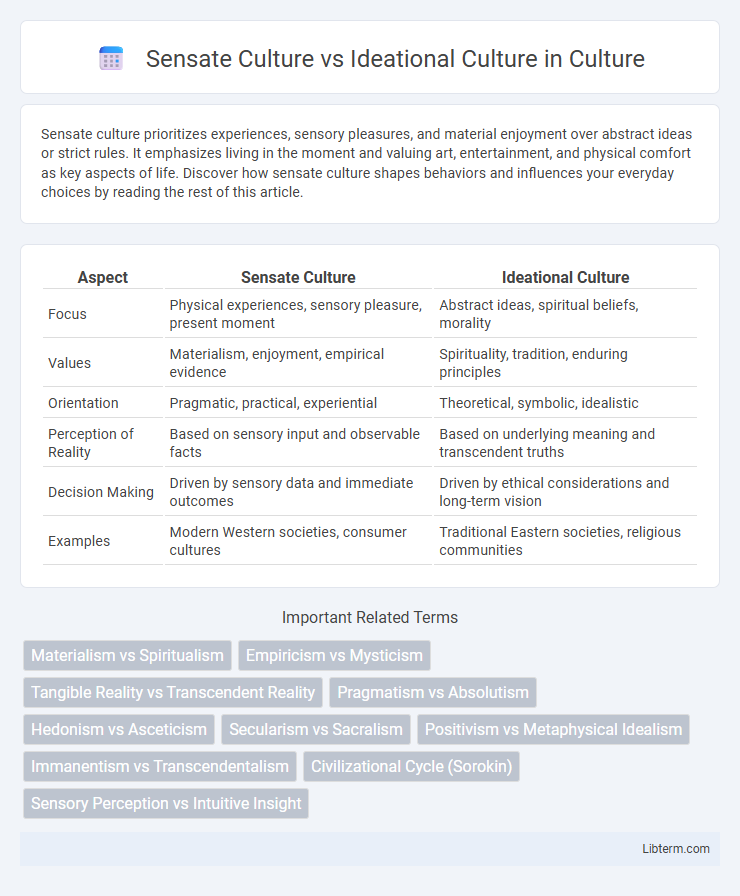Sensate culture prioritizes experiences, sensory pleasures, and material enjoyment over abstract ideas or strict rules. It emphasizes living in the moment and valuing art, entertainment, and physical comfort as key aspects of life. Discover how sensate culture shapes behaviors and influences your everyday choices by reading the rest of this article.
Table of Comparison
| Aspect | Sensate Culture | Ideational Culture |
|---|---|---|
| Focus | Physical experiences, sensory pleasure, present moment | Abstract ideas, spiritual beliefs, morality |
| Values | Materialism, enjoyment, empirical evidence | Spirituality, tradition, enduring principles |
| Orientation | Pragmatic, practical, experiential | Theoretical, symbolic, idealistic |
| Perception of Reality | Based on sensory input and observable facts | Based on underlying meaning and transcendent truths |
| Decision Making | Driven by sensory data and immediate outcomes | Driven by ethical considerations and long-term vision |
| Examples | Modern Western societies, consumer cultures | Traditional Eastern societies, religious communities |
Defining Sensate Culture: Characteristics and Examples
Sensate culture is characterized by a focus on concrete experiences, materialism, and sensory pleasures, often valuing aesthetics, physical comfort, and empirical evidence over abstract ideas or traditions. These cultures prioritize tangible realities and practical outcomes, commonly seen in modern Western societies like the United States and much of Europe, where innovation, consumerism, and scientific inquiry dominate. Examples of sensate culture include the emphasis on technology, entertainment industries, and a preference for direct observation and experimentation in education and governance.
Understanding Ideational Culture: Core Concepts
Ideational culture centers on abstract ideas, values, and spiritual beliefs as the foundation of societal norms and behaviors. It prioritizes meaning and purpose over material success, emphasizing collective identity and tradition in shaping human interactions. Understanding ideational culture involves recognizing how symbolic meanings and shared ideologies drive social cohesion and guide decision-making processes.
Historical Emergence of Sensate and Ideational Cultures
Sensate and ideational cultures emerged from differing historical contexts where sensate cultures prioritizing empirical experience and sensory perception arose prominently during the Renaissance and Enlightenment periods, emphasizing scientific observation and material reality. Ideational cultures, rooted in ancient religious and philosophical traditions, focus on spiritual, symbolic, and metaphysical interpretations of existence, often shaped by early civilizations' quest for meaning beyond the tangible world. These cultural paradigms reflect evolving human approaches to knowledge, with sensate cultures advancing through industrialization and modernity, while ideational cultures preserve continuity in mythic and religious worldviews.
Key Differences Between Sensate and Ideational Worldviews
Sensate culture prioritizes empirical experience, sensory perception, and tangible realities, emphasizing external facts and immediate gratification, while ideational culture values ideas, beliefs, and spiritual or abstract principles, focusing on internal meanings and long-term visions. Sensate worldviews are characterized by a preference for practicality, materialism, and observable phenomena, whereas ideational worldviews highlight moral values, religion, and the significance of metaphysical concepts. The key difference lies in how each worldview interprets reality: sensates rely on direct sensory input, and ideationalists interpret reality through conceptual frameworks and ideological commitments.
Influence of Sensate Culture on Modern Society
Sensate culture, characterized by an emphasis on sensory experiences, materialism, and empirical evidence, significantly shapes modern society through the prioritization of consumerism, technological innovation, and entertainment industries. This cultural orientation drives economic growth by fostering demand for tangible products and immersive experiences, influencing social behaviors and lifestyle choices. The prevalence of visual media, digital communication, and experiential marketing demonstrates the profound impact of sensate culture on shaping contemporary values and societal trends.
Impacts of Ideational Culture on Values and Beliefs
Ideational culture profoundly shapes values and beliefs by prioritizing spiritual and intellectual pursuits over materialism, fostering strong adherence to tradition, religion, and ethical codes. This cultural orientation influences social behavior by emphasizing moral principles, community cohesion, and a collective sense of purpose rooted in metaphysical or ideological frameworks. The impact of ideational culture manifests in resistance to rapid change, preservation of historical norms, and a worldview centered on meaning and transcendence rather than sensory experiences.
Cultural Shifts: Transitioning Between Sensate and Ideational Modes
Cultural shifts between Sensate and Ideational modes reflect a society's transition from a focus on empirical experiences and material reality to an emphasis on abstract ideas, values, and spiritual beliefs. This transition often occurs during periods of social transformation, where changing economic conditions, technological advancements, or ideological movements reshape collective worldviews. Understanding these modes helps analyze historical patterns, such as the move from Renaissance Sensate curiosity to Enlightenment Ideational rationalism, highlighting how cultures balance sensory engagement with intellectual principles.
Artistic and Intellectual Expressions in Both Cultures
Sensate cultures emphasize sensory experience and tangible artistic expressions, favoring visual arts, music, and performance that engage the senses directly, while ideational cultures prioritize symbolic meaning and abstract intellectual expressions found in literature, philosophy, and religious art. In sensate cultures, artistic creativity often manifests through experimentation with form and material to evoke emotional and physical responses, whereas ideational cultures focus on conveying metaphysical concepts, moral narratives, and intellectual discourse. These cultural distinctions influence educational priorities, with sensate societies promoting hands-on learning and aesthetic appreciation and ideational societies valuing theoretical knowledge and symbolic interpretation.
Societal Outcomes: Materialism vs Spirituality
Sensate cultures prioritize materialism, emphasizing sensory experiences, wealth accumulation, and tangible achievements as key societal outcomes, reflecting a focus on external gratification and physical reality. In contrast, ideational cultures emphasize spirituality and intellectual pursuits, valuing moral principles, religious beliefs, and inner meaning over material success. This fundamental difference influences societal values, shaping attitudes towards consumption, social behavior, and collective purpose in each cultural context.
The Future of Culture: Sensate, Ideational, or Synthesis?
Sensate culture emphasizes empirical experience, sensory perception, and material reality, driving innovation through tangible, technological advances. Ideational culture prioritizes ideas, values, and spiritual or ideological frameworks, influencing long-term societal goals and ethical progress. The future of culture likely lies in a synthesis that balances sensory empirical knowledge with ideational principles, fostering holistic development and resilient societies.
Sensate Culture Infographic

 libterm.com
libterm.com